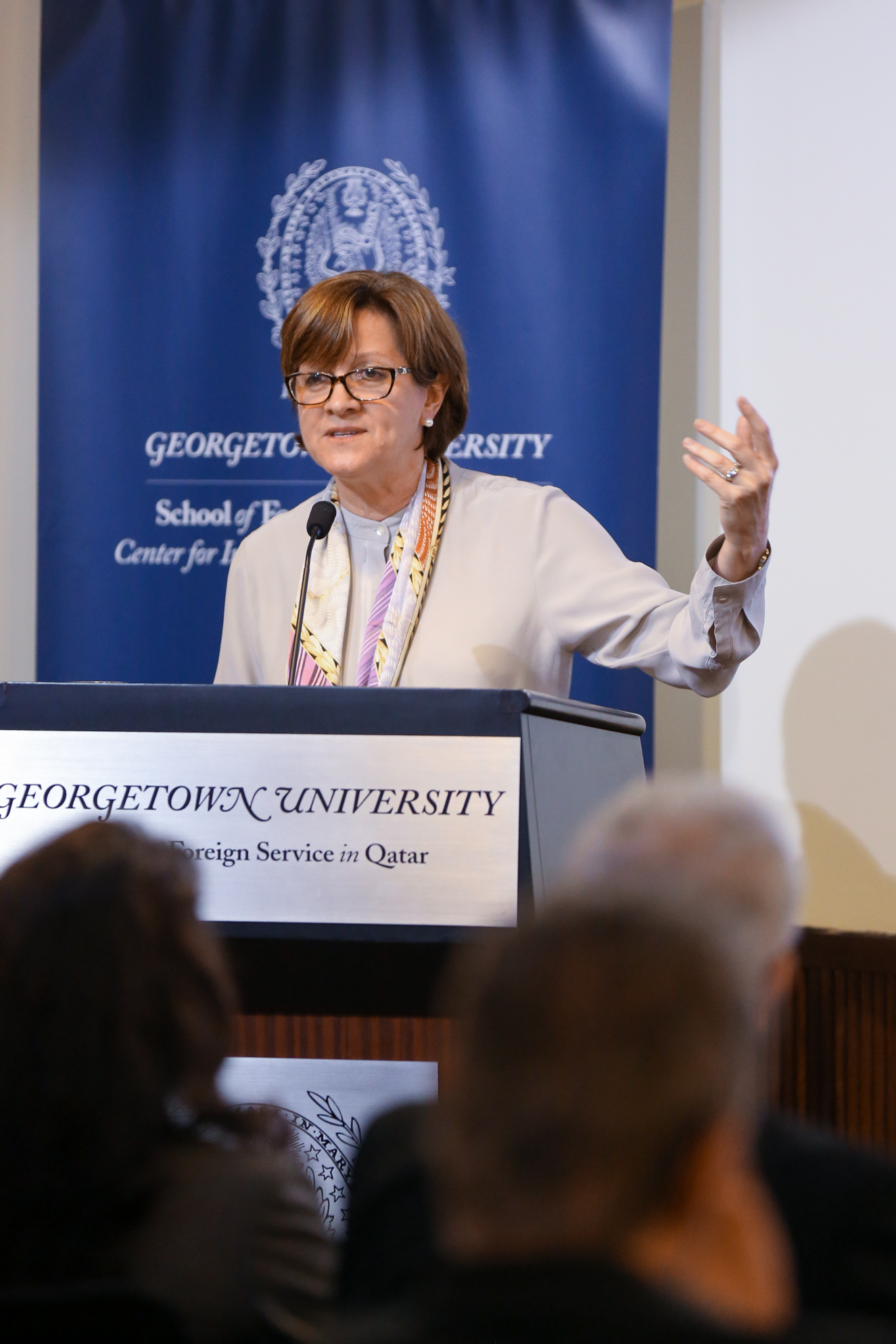Dialogue Series, Race & Society, Regional Studies
The Politics of National Narratives: The Evolution of 'Revolution' in Egypt

Laurie Brand, the Robert Grandford Wright Professor of International Relations and Middle East Studies at the University of Southern California, delivered a CIRS Monthly Dialogue on “The Politics of National Narratives: The Evolution of ‘Revolution’ in Egypt” on March 23, 2015. The talk reflected some of the main themes presented in her recent book, Official Stories: Politics and National Narratives in Egypt and Algeria, including how ruling elites actively construct a national narrative for political purposes.
Brand described national narratives as collective stories, whether official or popular, that seek to define a country’s identity, history, and mission using particular historical events and heroes, and including purported collective cultural, linguistic, religious, or ethnic markers. As part of a broader study, Brand’s research examines the legitimizing role that national narratives play in regime maintenance, and questions how and why they may change. “I chose to look only at manifestations of an ‘official’ narrative. But even there, a narrative is multi-stranded, and can be quite complex because it includes not just the state’s version of national history, but also a range of values, aspirations, and identity elements,” she said.
In order to understand how national narratives are mobilized by state authorities, Brand explained that they are often employed as a relegitimizing force during times of contested succession or political rupture. National narratives involve “the creation of a ‘usable’ past; that is, the construction of a national history that can be mobilized, that can be channeled, and that can be used by a leadership for a demand, need, or a crisis in the present,” she argued. These narratives can be read in a variety of official and unofficial political, social, and cultural texts, whether through state proclamations, cultural texts the media, or the educational system, among many other outlets for imparting some form of collective instruction.
In particular, Brand analyzed traits of the official story of “revolution” in the case of Egypt, and noted that, since January 2011, many associate the concept of revolution with contemporary Egyptian events. However, the very concept of revolution has been integral to the Egyptian national narrative for well over a century, and, indeed, makes up the founding story of the Egyptian nation state as it emerged after July 1952. The language of revolution has been used throughout Egyptian political history as part of a legitimation strategy, especially during regime changes, whether through anti-colonial struggles, the Free Officers’ 1952 overthrow of King Faruq, or Anwar Sadat’s struggle to consolidate his rule after he succeeded Gamal Abd Al-Nasir. Even during the Mubarak era, fidelity to the 1952 revolution was regularly invoked during ceremonial speeches, but its importance began to wane as the regime moved farther and farther away from the 1952 revolution’s emphasis on economic and social justice to the implementation of neo-liberal economic policies.
In conclusion, Brand returned to the most recent invocations of the revolutionary narrative, and the struggles surrounding it. “The meaning of the term ‘revolution’ was constructed and re-constructed over time in Egypt,” and has evolved over the course of Egyptian history to take on different meanings, demonstrating that even if critical elements of such narratives are rescripted, the elements themselves remain central to the legitimation formulas of successive regimes or leaderships. With the overthrow of Mubarak and Morsi, and the coming to power of Abd al-Fattah al-Sisi, the Egyptian people have been confronted with several overlapping and conflicting narratives of revolution or political change—January 25 and/or June 30—through which they must navigate. “These issues are not simply of academic interest, but are very real battles that are very much a part of ongoing struggles today in Egypt and in other parts of the Middle East over the future of the political system,” she concluded.
Laurie A. Brand directed the University of Southern California’s Center for International Studies from 1997 to 2000, the School of International Relations from 2006 to 2009, and is currently the director of its Middle East Studies Program. Brand served as president of the Middle East Studies Association in 2004, and she has chaired its Committee on Academic Freedom since 2006. A four-time Fulbright scholar to the Middle East and North Africa, a Carnegie scholar 2008 to 2010, and a Rockefeller Bellagio writing residency fellow in fall 2012, she is the author of Palestinians in the Arab World (Columbia University Press, 1988), Jordan’s Inter-Arab Relations (Columbia University Press, 1994), Women, the State and Political Liberalization (Columbia University Press, 1998), Citizens Abroad: States and Emigration in the Middle East and North Africa (Cambridge University Press, 2006), and Official Stories: Politics and National Narratives in Egypt and Algeria (Stanford University Press, 2014).
Article by Suzi Mirgani, Manager and Editor for CIRS Publications